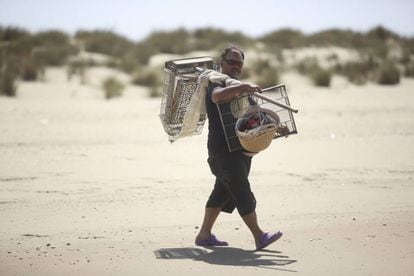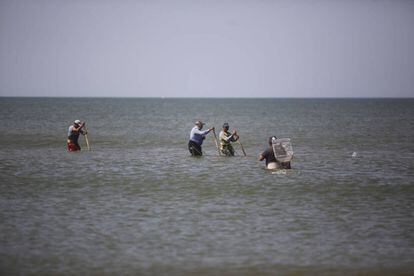From illegal fishermen to a Spanish supermarket success story
A group of traditional shellfish catchers has managed to go legitimate and now sell their products to the Mercadona chain


Emilio Vidal has never had an easy life. He could have resigned himself to the difficult hand he was dealt, but he isn’t one for self-pity. It has been 30 years since, after realizing the fields of Sanlúcar could not feed him, he left with his brother-in-law and took up fishing for coquinas, or wedge clams, by boat.
His mother encouraged him to specialize in catching shellfish, as so many before him in their town had done. After scouring the seas near Doñana National Park, he would wander through the alleyways of Cádiz selling his daily catch. But Vidal still longed for more. He dreamed of owning his own fish-mongering business where his products could reach restaurants legally and regularly. Now, at 56 years old, you could say that he has reached and surpassed this goal: he is currently the head of a company called Mariscadores de Sanlúcar (Sanlúcar Fishermen), thanks to which his La Fina de Doñana brand can now be found in the aisles of Mercadona, Spain’s main supermarket chain.
“Now, we have the relief of knowing that we’ll sell everything we catch, that we won’t have transportation or sanitation problems,” says Vidal
“The change is huge,” says Vidal as he boards the barge that will bring him to another day’s work in Doñana. He doesn’t hide his satisfaction at knowing that all his and his 14 coworkers’ hard work has meant they can go legitimate. “My plan wasn’t to stay here selling illegally. That’s why, 11 years ago, some of us came together so we could all sell within the market,” Vida explains. In contrast with the many others who continue selling illegally, Vidal and his companions obtained licenses and permits to be able to fish in Doñana waters – the first step on the path toward legality.
However, even though they had permits to fish, after four hours waist-deep in water, using the full force of their bodies to land their haul, Vidal and his companions would go back to the dock and try unsuccessfully for days to sell the clams – or they managed to sell them, but at a loss. “They couldn’t continue like that. They could only sell three or four months per year, and that’s not enough to maintain a family. It got to the point of social exclusion,” says Faustino Lozano, now manager of the company Vidal presides. “I saw that Mercadona was buying fish at the market, and I said to myself, why can’t I sell to them too?” explains the president. Lozano, financial advisor, fish expert and registered trademark specialist, put the project together two years ago.
A new supplier
On the other side of this fishmonger-to-entrepreneur transformation is a business that is now reevaluating how it deals with fresh products. “We wanted to have specialist suppliers, to get closer to the primary sector,” a Mercadona representative explains. After the supermarket chain found Vidal and his colleagues, full of hope and ambition, the parties reached an agreement, with a few conditions: Vidal had to go register as a self-employed worker and comply with strict food-safety controls. In return, Mercadona managed to double the sale price of the shellfish. “Now we know that we’ll sell everything we catch, that we won’t have transportation or sanitation problems,” says Vidal.

“There’s always this image of poachers as the only ones catching shellfish, but now they’ve demonstrated that there are other ways to work and do it well,” Lozano says. Vidal and his colleagues meet all of the rules established by the Doñana Natural Park. They can’t capture more than 25 kilograms per person per day; there are months of closed season; they can only work during one tide each day; and they have to respect the minimum size regulations when it comes to the clams.
Their work hours are determined by high tide and low tide. They take a barge across the Guadalquivir River, getting around on mopeds and equipped with traditional tools that they make themselves, weighing almost 20 kilos. Currently, they work from noon to 5pm. They don’t expect to catch more than five kilos, which is the average during this time of year, as opposed to the 10 kilos of seafood that they sometimes bring in during the winter. In total, between all of them they can catch some 60 kilos daily during the summer, and 400 kilos in the winter.
Working in a natural park
“Doñana creates a lot of jobs,” explains the director of the natural park, Juan José Chan. Traditional professions such as shellfishing, livestock farming and breeding, beekeeping and pineapple harvesting also find positions in Doñana, all carefully overseen and controlled. “The continued existence of these activities are part of the founding statutes of this park. Sometimes people think that these natural spaces are virginal, but it must not be forgotten that they have been modeled especially for man,” Chan explains.
In dealing with the wildness of the natural paradise, the fishermen can count only on the strength of their bodies. “They’re the gladiators of the sea. Their work is incredibly difficult,” Lozano says. Dressed in wetsuits, they secure their rake to their waist, plowing through the sand to capture the clams. From there, the fishermen extract them and pass them through a sieve to filter out any that are too small, which are returned to the water. “It’s very hard, we all have back issues,” Vidal says, adding, “In the summer, anyone can be a sailor. In the winter, you break the ice layer with your bare feet. A colleague died from being struck by lightning during a storm a few years ago, and since then, we don’t work on days like that.”
Sign up for our newsletter
EL PAÍS English Edition has launched a weekly newsletter. Sign up today to receive a selection of our best stories in your inbox every Saturday morning. For full details about how to subscribe, click here
After a day’s work, the fishermen return to Sanlúcar, where a refrigerated van awaits them on the other shore. After loading in each man’s catch, they head to the Caladero fishing facilities in Cádiz: one of Mercadona’s middle-man suppliers that prepares and packages the fish. There, Ernesto Chalela, the plant director, receives the merchandise. “We had to come to a point of mutual trust. It was a product we weren’t working with before, since here we had dedicated ourselves to mussels and shrimp. It wasn’t easy to take the fishermen out of their routine, and we had to adapt to how they operate. But now we can say that both parties are very pleased to be working together,” reports the director.
Since the clams are caught in a natural park, they don’t have to be treated or purified. However, Caladero puts them through a 24-hour sand-removal process, checks that all meet the size requirements, and analyzes them in a laboratory to see if they contain any bio-toxins. After, they package them in half-kilo bags and distribute them to Mercadona locations. La Fina de Doñana process is completed, and the product will fly off the shelves soon after the stores open, to the satisfaction of Vidal and his crew. He couldn’t help but remember his mother. “She was the one that encouraged me, and she spent 5,000 pesetas to buy me the tools I needed.” Now his son Emilio is following in his father’s footsteps as both a fishermen and an entrepreneur.
English version by Allison Light.












































